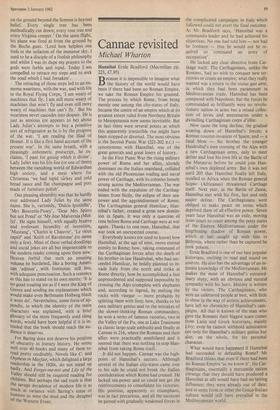Cannae revisited
Michael Wharton
Hannibal Ernle Bradford (Macmillan pp. 223, £7.95)
Bit is impossible to imagine what the, history of the world would have been if there had been no Roman Empire, we take the Roman Empire for granted. The process by which Rome, from being merely one among the city-states of Italy, became the centre of an empire which at its greatest extent ruled from Northern Britain to Mesopotamia now seems inevitable. But in fact there were several points at which this apparently irresistible rise might have been stopped or diverted. The most obvious is the Second Punic War (221-202 u.c.) synonymous with Hannibal, one of the great generals and great losers of history.
In the First Punic War the rising military power of Rome and her allies, already dominant on the Italian mainland, collided with the old Phoenician trading and naval power of Carthage, with its colonies loosely strung across the Mediterranean. The war ended with the expulsion of the Carthag- inians from Sicily, the eclipse of their sea- power and the aggrandisement of Rome. The Carthaginian general Hamilcar, Han- nibal's father, created a great new domin- ion in Spain. It was only a question of time before Rome and Carthage were at war again. Thanks to one man, Hannibal, that war took an unexpected course.
Everybody knows (or used to know) how Hannibal, at the age of nine, swore eternal enmity to Rome; how, taking command of the Carthaginian forces after the death of his brother-in-law Hasdrubal, who had suc- ceeded Hamilcar, he boldly planned to in- vade Italy from the north and strike at Rome directly; how he accomplished a feat unprecedented and supposed impossible by crossing the Alps (complete with elephants and, according to legend, by melting the rocks with vinegar — more probably by splitting them with fire); how, thanks to his own military genius and to the mistakes of the slower-thinking Roman commanders, he won a series of famous victories, two in the Valley of the Po, one at Lake Trasimene (a classic large-scale ambush) .and finally at Cannae in 216, where the Romans and their allies were practically annihilated and it seemed that there was nothing to stop Han- nibal from taking Rome itself.
It did not happen. Cannae was the high- point of Hannibal's success. Although several of the Italian city-states came over to his side he could not break the Italian confederation which Rome had created. He lacked sea-power and so could not get the reinforcements to consolidate his victories. His position, apparently so triumphant, was in fact precarious, and all the successes he gained with gradually weakened forces in the complicated campaigns in Italy which followed could not avert the final outcome. As Mr Bradford says, 'Hannibal was a commando-leader and he had achieved his objectives. No one had told him — nor had he foreseen — that he would not be re- quired to command an army of occupation'.
He lacked any clear directive from Car- thage itself. The Carthaginians, unlike the Romans, had no wish to conquer new ter- ritories or create an empire; what they really wanted was a return to the status quo ante, in which they had . been paramount in Mediterranean trade. Hannibal has been compared with Napoleon; but the forces he commanded so brilliantly were no revolu- tionary nation in arms but a mixed collec- tion of levies and mercenaries under a dwindling Carthaginian corps d'elite.
Now came the long decline; the gradual wearing down of Hannibal's forces; a Roman counter-invasion of Spain; and — a fatal blow — his brother the younger Hasdrubal's own crossing of the Alps with a new Carthaginian army, only to meet defeat and lose his own life at the Battle of the Mataurus before he could join Han- nibal's own depleted army. But it was not until 203 that Hannibal finally left Italy, recalled to Africa when the Roman general Scipio (Africanus) threatened Carthage itself. Next year, at the Battle of Zama, Hannibal met with his first, last and only major defeat. The Carthaginians were obliged to make peace on terms which deprived them of all effective power. Seven years later Hannibal was an exile, moving from court to court among the petty states of the Eastern Mediterranean under the lengthening shadow of Roman power, which at last caught up with him in Bithynia, where rather than be captured he took poison.
Ernle Bradford is one of our best popular historians, exciting to read and sound on sources. He also has the advantage of an in- timate knowledge of the Mediterranean. He makes the most of Hannibal's extraord- inary story, with an obvious and natural sympathy with his hero. History is written by the victors. The Carthaginians, who were an unlettered people at best, with little to show in the way of artistic achievements, have left no chronicles of Hannibal's cam- paigns. All that is known of the man who gave the Romans their biggest scare comes from Latin and Greek historians, mainly Livy; even he cannot withhold admiration not only for Hannibal's military genius but also, on the whole, for his personal character.
What would have happened if Hannibal had succeeded in defeating Rome? Mr Bradford thinks that even if there had been no Roman Empire 'as we know it', the Car- thaginians, essentially a mercantile nation (strange that they should have produced a Hannibal at all) would have had no lasting influence; they were already out of date; and in some•form or other the Greco-Italian culture would still have prevailed in the Mediterranean world.


































 Previous page
Previous page